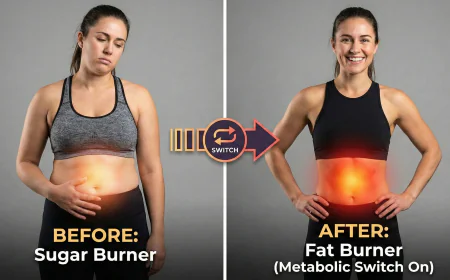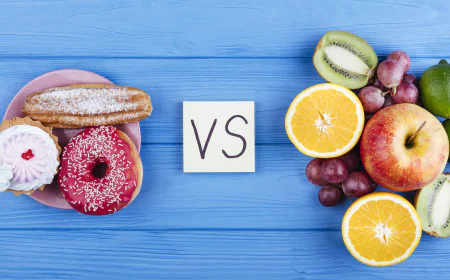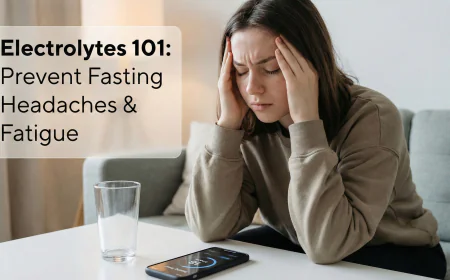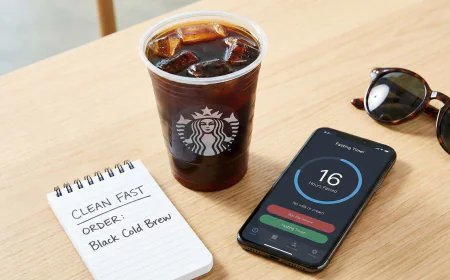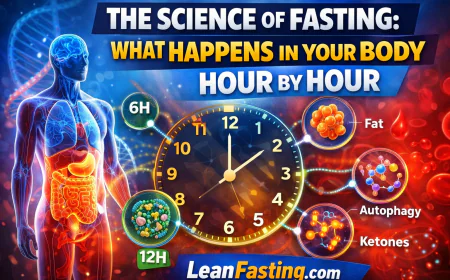Intermittent Fasting: How Does It Work & Why It’s Effective
How does intermittent fasting work? Learn the science behind fasting, fat burning, autophagy, and the real health benefits of time-restricted eating.

Intermittent Fasting: How Does It Work? Science, Benefits & Real Results
Intermittent fasting (IF) is more than a diet trend — it's a time-based eating strategy backed by science. But one of the most common questions beginners ask is: "How does intermittent fasting work?"
In this complete guide, we’ll break down the biology, the benefits, and the mechanisms behind intermittent fasting, helping you understand exactly what happens to your body when you fast — and why it works so well for health and fat loss.
What Is Intermittent Fasting?
Intermittent fasting is an eating pattern that alternates between periods of eating and periods of not eating (fasting). Unlike diets that tell you what to eat, IF focuses on when you eat.
| Method | Fasting Period | Eating Window |
|---|---|---|
| 16:8 | 16 hours | 8 hours (e.g., 12 PM–8 PM) |
| 18:6 | 18 hours | 6 hours (e.g., 1 PM–7 PM) |
| 20:4 | 20 hours | 4 hours (e.g., OMAD) |
| 5:2 | 2 days/week | 500–600 kcal fasting days |
| Alternate Day Fasting | Every other day | Normal eating alternate days |
So, How Does Intermittent Fasting Work?
- Blood Sugar & Insulin Drop: After eating, glucose fuels your body. When you fast, insulin drops, signaling fat burning. Glycogen stores deplete (~12 hrs), shifting to stored fat.
- Ketosis: At 12–16 hrs, your body produces ketones from fat—fueling brain and muscles, boosting clarity and energy.
- Autophagy: Fasting triggers cellular “cleanup,” removing damaged proteins and cells, reducing inflammation and promoting longevity.
- Hormone Optimization: HGH rises (fat burning & muscle repair), norepinephrine increases (metabolism boost), insulin decreases (fat loss).
Hour-by-Hour During a Fast
| Time Since Last Meal | What Happens |
|---|---|
| 0–4 hours | Digestion; blood sugar & insulin rise |
| 4–8 hours | Blood sugar stabilizes; insulin drops |
| 8–12 hours | Glycogen depletes; preps fat-burning |
| 12–16 hours | Ketosis begins; fat used for energy |
| 16–24 hours | Autophagy activates; cell repair |
Health Benefits of How IF Works
- Weight Loss: Burns fat without constant calorie restriction; preserves muscle.
- Metabolic Health: Lowers blood sugar; improves insulin sensitivity; reduces inflammation.
- Brain Health: Increases BDNF; may reduce Alzheimer’s risk; improves focus & mood.
- Heart Health: Lowers blood pressure; reduces LDL cholesterol & triglycerides.
Does It Matter What You Eat?
Yes. Fasting controls when, but quality still counts.
Best Foods:
- Whole proteins (eggs, chicken, tofu)
- Healthy fats (avocado, olive oil, nuts)
- Complex carbs (quinoa, oats, sweet potatoes)
- Leafy greens & fiber-rich veggies
Avoid:
- Sugary snacks & drinks
- Processed junk foods
- Constant snacking during eating window
Sample 16:8 Intermittent Fasting Day
| Time | What to Do |
|---|---|
| 8:00 AM | Water, black coffee, green tea (fasting) |
| 12:00 PM | Break fast: Eggs + avocado toast |
| 3:00 PM | Snack: Handful of nuts or fruit |
| 7:30 PM | Dinner: Grilled chicken + vegetables + quinoa |
| 8:00 PM–Next Day Noon | Fasting window |
Who Should Try & Who Should Avoid
- People wanting to lose weight naturally
- Those with insulin resistance
- Busy professionals avoiding calorie counting
- Avoid/Consult Doctor: Pregnant/breastfeeding, eating disorder history, diabetics on meds, underweight individuals.
Realistic Results: What to Expect Over Time
| Week | What Happens |
|---|---|
| Week 1 | Adjusting: light hunger, improved digestion |
| Week 2 | Lower insulin, better energy |
| Week 3 | Mental clarity, appetite regulation |
| Week 4 | Visible fat loss, reduced inflammation |
Tips to Get Started
- Start with 12:12, then move to 16:8.
- Stay hydrated throughout the fast.
- Keep busy during fasting hours.
- Don’t overeat in your eating window.
- Prioritize whole, clean foods.
Conclusion
So, how does intermittent fasting work? It optimizes your natural rhythm—shifting from sugar-burning to fat-burning, improving hormones, and triggering cell repair. It’s not starvation—it’s giving your body time to reset, recover, and thrive.
Whether you seek better energy, brain function, or weight loss, IF gives your body a safe, natural boost.
"Curious whether fasting is better than injections? This GLP-1 vs intermittent fasting comparison by Lean Fasting breaks it all down clearly."
FAQs – Intermittent Fasting: How It Works
Q1: Does intermittent fasting really burn fat?
Yes—once glycogen stores deplete, your body burns stored fat for energy.
Q2: How long to fast for autophagy?
Autophagy generally begins around 16+ hours of fasting, but varies per person.
Q3: Will fasting slow my metabolism?
No—short-term fasting can increase metabolism due to adrenaline and HGH boosts.
Q4: What can I drink during a fast?
Water, black coffee, unsweetened tea, and apple cider vinegar in water are allowed.
Q5: Easiest way to start?
Begin with a 12-hour fast, drink plenty of water, then gradually increase to 16:8.





